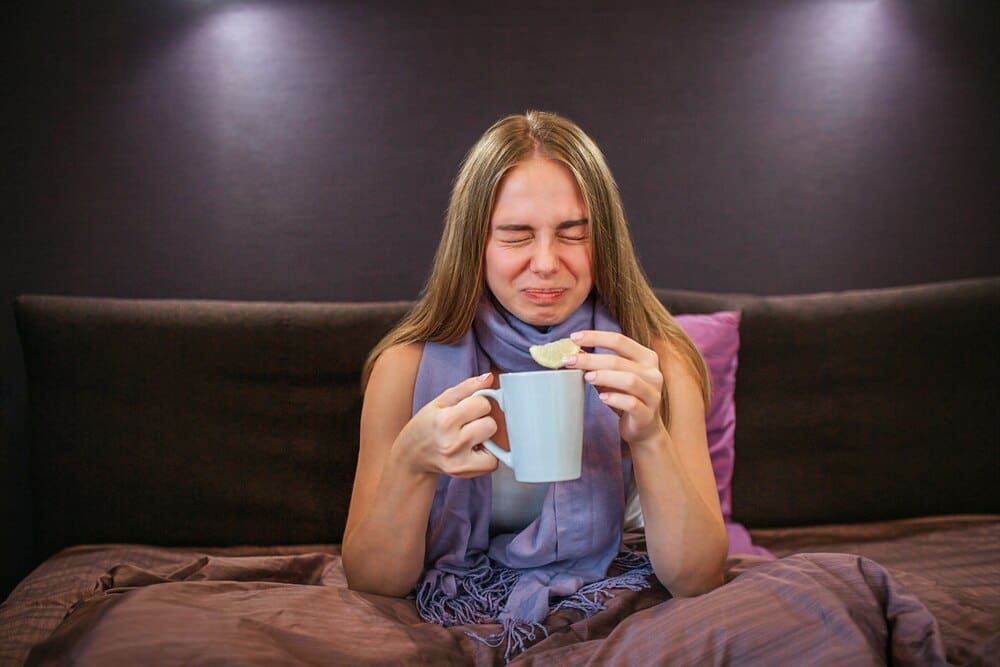For anyone seeking to reclaim a peaceful night’s rest, the simple act of brewing and sipping a warm, caffeine-free herbal tea can be a profoundly effective and natural sleep aid. Best enjoyed in a calm setting about 30 to 60 minutes before bed, specific herbal infusions—from classic chamomile to potent valerian root—contain natural compounds that work to quiet the nervous system, reduce anxiety, and gently coax the body into a state of relaxation. This nightly ritual serves not only as a biochemical nudge toward slumber but also as a powerful psychological cue, signaling to your brain and body that the day is over and it is time to unwind and prepare for deep, restorative sleep.
Why Turn to Tea for Sleep?
In a world saturated with sleep-tracking gadgets and powerful pharmaceuticals, the enduring appeal of a simple cup of tea might seem quaint. Yet, its effectiveness is rooted in a combination of science, tradition, and the power of ritual. The warmth of the beverage itself is inherently soothing, capable of slightly raising body temperature before it drops, a natural signal that helps initiate sleepiness.
Beyond temperature, the true magic lies in the herbs themselves. Many of the botanicals used in sleep teas are classified as nervines, which are herbs that specifically support and calm the nervous system. Others function as mild adaptogens, helping the body manage stress more effectively. These plants contain bioactive compounds that interact with our brain chemistry in gentle but meaningful ways.
The act of preparing tea also establishes a critical buffer between a hectic day and a restful night. This routine—boiling the water, steeping the leaves, inhaling the steam—becomes a form of mindfulness. It forces a pause, encouraging you to disconnect from screens and the day’s worries, creating a dedicated space for tranquility that is essential for good sleep hygiene.
It is crucial, however, to distinguish between true teas and herbal teas. True teas, including black, green, and oolong, all come from the Camellia sinensis plant and naturally contain caffeine, a stimulant that is the enemy of sleep. Herbal teas, technically called tisanes, are infusions made from caffeine-free botanicals like flowers, roots, and leaves, making them the ideal choice for a pre-bedtime beverage.
The Top Teas for Restful Sleep
While many herbal teas are relaxing, several stand out for their scientifically supported, sleep-promoting properties. Each offers a unique profile of flavor and therapeutic action, allowing you to choose the one that best suits your needs and palate.
Chamomile Tea: The Classic Sleep Aid
Chamomile is perhaps the most famous and widely trusted sleep tea, and for good reason. Used for centuries as a folk remedy for everything from anxiety to upset stomachs, its reputation as a sleep aid is backed by modern science. The delicate, apple-like flavor makes it a pleasant and accessible choice for nearly everyone.
The primary sleep-promoting compound in chamomile is an antioxidant called apigenin. This compound binds to specific benzodiazepine receptors in the brain—the same receptors targeted by anti-anxiety medications. This action helps to decrease anxiety and initiate a feeling of drowsiness, making it easier to fall asleep.
Studies have shown that chamomile can modestly improve sleep quality, particularly for postpartum women struggling with poor sleep and for older adults. While it may not be a powerful sedative for severe insomnia, it is an excellent and safe choice for calming the mind and easing into a gentle slumber.
Valerian Root Tea: The Potent Sedative
If chamomile is a gentle nudge, valerian root is a more assertive push toward sleep. Known for its potent sedative qualities, valerian has a very strong, earthy aroma that some compare to dirty socks—a scent many are willing to overlook for its powerful effects. It has been used as a medicinal herb since the time of ancient Greece and Rome.
The science behind valerian is complex, but it is believed to work by increasing the brain’s supply of a neurotransmitter called gamma-aminobutyric acid (GABA). GABA is an inhibitory neurotransmitter, meaning it blocks impulses between nerve cells in the brain, resulting in a calming, sedative effect. Low GABA levels are often linked to anxiety and poor sleep.
Valerian root tea is best for those who have more significant trouble falling or staying asleep. Be aware that for a small percentage of people, it can cause a paradoxical stimulating effect. It may also induce vivid dreams and, occasionally, a slight feeling of grogginess the next morning, so it’s wise to try it for the first time on a night when you don’t have an early start.
Lavender Tea: The Aromatic Relaxant
Known primarily for its iconic, calming scent in aromatherapy, lavender is also a highly effective relaxant when consumed as a tea. Made from the small purple buds of the flowering plant, lavender tea offers a distinctive floral flavor that is both soothing and sophisticated.
Much of lavender’s power comes from its aroma. Simply inhaling the scent of lavender has been shown to slow the heart rate, lower blood pressure, and decrease skin temperature, all signs of the body shifting into a relaxed state. When you drink the tea, you benefit from both this aromatherapy effect and the internal absorption of compounds like linalool, which has documented anxiety-reducing properties.
This tea is an excellent choice for individuals whose sleep problems are tied directly to stress and anxiety. The dual-action of its scent and its chemical composition works to soothe both the mind and the body simultaneously.
Lemon Balm Tea: The Mood-Lifting Soother
A member of the mint family, lemon balm has a bright, citrusy flavor and aroma that is both uplifting and calming. It has been used for over 2,000 years to reduce stress, ease anxiety, and promote a sense of well-being. This makes it a great option for those whose racing thoughts or low mood keep them awake.
Like valerian, lemon balm appears to work by modulating GABA levels in the brain. It contains compounds, including rosmarinic acid, that inhibit the enzyme that breaks down GABA, thereby increasing its availability. This helps to quiet an overactive mind and induce a state of calm conducive to sleep.
Additionally, lemon balm is known for its ability to soothe indigestion, a common sleep disruptor. A cup of lemon balm tea after dinner can therefore serve a dual purpose, settling both your stomach and your mind before bed.
Passionflower Tea: The Anxiety Quieter
Native to the Americas, passionflower has long been used by indigenous peoples as a calming agent. It has a mild, earthy, and slightly grassy flavor. It is particularly effective for people who experience “mental chatter” or circular, anxious thoughts when they lie down to sleep.
The mechanism of passionflower is similar to that of other sleep teas: it is believed to boost the level of GABA in the brain. By calming brain activity, it helps to short-circuit the anxiety loops that can prevent the onset of sleep. Some studies have found it to be as effective as certain prescription drugs for managing generalized anxiety disorder.
A small study published in Phytotherapy Research found that participants who drank passionflower tea nightly for one week reported significant improvements in their sleep quality compared to a placebo group. This makes it a strong contender for anyone whose primary sleep obstacle is a busy mind.
How to Create the Perfect Bedtime Tea Ritual
Simply drinking the tea is only half the equation. To maximize its benefits, integrate it into a deliberate and consistent bedtime ritual that signals to your body it’s time to power down.
Timing is Everything
Drink your tea about 30 to 60 minutes before you plan to be asleep. This gives the herbal compounds time to take effect and, just as importantly, allows you to use the restroom one last time before getting into bed, preventing a sleep interruption later.
Set the Scene
Create an environment of tranquility. Dim the lights, as bright light suppresses the production of melatonin, the primary sleep hormone. Put away your phone, tablet, and laptop. The blue light emitted from these screens is particularly disruptive to your circadian rhythm.
Mindful Brewing and Sipping
Turn the preparation and consumption of your tea into a meditative practice. Pay attention to the sound of the water boiling, the color of the water as the tea infuses, and the warmth of the mug in your hands. Sip slowly, focusing on the aroma and taste, letting the day’s tensions melt away with each swallow.
What to Avoid Adding
While tempting, avoid adding sugar or large amounts of honey to your bedtime tea. A spike in blood sugar can be stimulating and may interfere with sleep later in the night as your levels crash. If you need a touch of sweetness, a very small amount of honey or a natural, non-caloric sweetener like stevia is a better choice.
Important Considerations and When to See a Doctor
While herbal teas are generally safe for most people, they are not without potential considerations. Some herbs, particularly the more potent ones like valerian root, can interact with prescription medications, including sedatives, antidepressants, and blood thinners. Always consult with your doctor or pharmacist if you are taking any medications.
If you are pregnant, breastfeeding, or have a pre-existing medical condition, it is essential to speak with a healthcare provider before incorporating new herbal remedies into your routine. Though natural, these herbs are biochemically active and should be treated with respect.
Finally, it is vital to recognize that herbal tea is a tool for managing mild to moderate sleep issues and improving sleep hygiene. It is not a cure for chronic insomnia, sleep apnea, restless legs syndrome, or other serious sleep disorders. If your sleep problems are severe, persistent, or significantly impacting your daily life, it is crucial to seek a diagnosis from a medical professional.
Ultimately, incorporating a carefully chosen herbal tea into your evening is a gentle, enjoyable, and time-honored strategy for cultivating better sleep. By embracing the ritual and harnessing the subtle power of these botanicals, you can transform your bedtime from a source of anxiety into a moment of peaceful sanctuary, paving the way for a night of deep and restorative rest.







